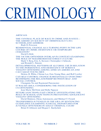
CRIMINOLOGY
Scope & Guideline
Exploring the Complexities of Law and Forensic Medicine.
Introduction
Aims and Scopes
- Crime and Social Inequality:
A core focus on how crime intersects with social inequalities, particularly concerning race, ethnicity, and socioeconomic status. This includes studies on racial disparities in arrests, sentencing, and victimization. - Policing and Community Relations:
Research examining the dynamics between law enforcement and communities, including perceptions of police legitimacy, community policing strategies, and the impacts of police actions on different demographic groups. - Mental Health and Criminal Behavior:
Explorations into the psychological aspects of crime, particularly how mental health issues affect both offenders and victims, and the implications for correctional practices. - Gang Dynamics and Disengagement:
An emphasis on understanding gang culture, the processes of disengagement from gangs, and the social and health impacts of gang involvement on individuals and communities. - Legal and Policy Implications:
Critical evaluations of legal frameworks, policies, and their effects on crime rates and recidivism, including discussions on financial obligations, incarceration, and rehabilitation. - Urban Crime and Environmental Factors:
Investigations into how urban environments, community structures, and public spaces influence crime rates and patterns, emphasizing the role of neighborhood characteristics.
Trending and Emerging
- Racial Disparities and Justice Reform:
An increasing number of publications focus on racial disparities within the criminal justice system, including studies on police interactions, sentencing disparities, and systemic racism, highlighting the need for reform. - Impact of Mental Health on Criminal Justice:
Research on the intersection of mental health and criminal justice is gaining prominence, particularly regarding the treatment of mental health issues among offenders and the implications for policy and practice. - Community Engagement and Crime Prevention:
There is a growing emphasis on community-oriented approaches to crime prevention, exploring how community engagement and local resources can effectively address crime and enhance public safety. - The Role of Technology in Crime:
New themes surrounding the impact of technology on crime, including the use of social media in criminal behavior, cybercrime, and the role of technology in policing, are emerging as significant areas of research. - Effects of Economic Factors on Crime:
The relationship between economic conditions and crime rates, including studies on unemployment, economic inequality, and their roles in shaping criminal behavior, is increasingly being explored.
Declining or Waning
- Traditional Theories of Crime:
There has been a noticeable decrease in research centered around classical criminological theories, such as strain theory and routine activity theory, as newer frameworks and interdisciplinary approaches gain traction. - General Crime Prevention Strategies:
Focus on generic crime prevention strategies has waned, with more emphasis now placed on tailored, community-specific interventions rather than broad, one-size-fits-all approaches. - Rural Crime Studies:
Research specifically addressing crime in rural contexts appears to be declining, possibly overshadowed by the increasing focus on urban crime dynamics and community issues. - Overly Theoretical Discussions:
Papers that are heavily theoretical without empirical backing seem to be less frequent, as the journal trends towards more data-driven and applied research. - Gender-specific Crime Analysis:
While gender remains a relevant factor, the prevalence of studies solely focused on gender differences in crime and victimization has decreased, leading to a broader, more intersectional approach.
Similar Journals

Crime Science
Uncovering the societal impacts of crime with cutting-edge studies.Crime Science, published by BMC, is a pioneering open access journal that has been at the forefront of interdisciplinary research since its inception in 2012. With its E-ISSN 2193-7680, this journal plays a crucial role in advancing knowledge across several vital domains including Cultural Studies, Law, Safety Research, and Urban Studies, with a remarkable Q1 ranking across all its categories in 2023. Situated in the United Kingdom, the journal boasts impressive Scopus rankings, placing it in the top 99th percentile for Cultural Studies and 95th percentile for Safety Research, among others. This strategic focus provides a platform for researchers, professionals, and students to explore the complexities of crime and its impact on society, aiming to foster informed discussions and innovative solutions. With a commitment to accessibility and a convergence period extending from 2013 to 2024, Crime Science not only promotes scholarly debate but also seeks to bridge theoretical insights and practical applications, making it an invaluable resource for anyone interested in the multifaceted aspects of crime and safety.

Journal of Criminological Research Policy and Practice
Shaping the Future of Criminological Policy and PracticeJournal of Criminological Research Policy and Practice is a pioneering platform dedicated to the exploration and dissemination of knowledge in the interdisciplinary field of criminology. Published by Emerald Group Publishing Ltd, this journal features high-quality research that addresses contemporary issues and innovative practices in areas such as law, public administration, and social psychology. With an ISSN of 2056-3841 and an E-ISSN of 2056-385X, the journal has garnered a notable presence in the academic community, showcasing a Q3 ranking in Law and Sociology & Political Science as of 2023. The journal provides valuable insights for researchers and practitioners alike, advancing the discourse on criminological policy and its implications for society. It serves as an essential resource for those invested in enhancing social justice, informing policy-making, and understanding the complexities of crime within a broader social context. Encompassing research from 2015 to the present and extending into 2024, the journal stands as a critical reference point for future studies and professional practice in criminology.
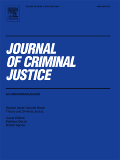
JOURNAL OF CRIMINAL JUSTICE
Transforming knowledge into practice in criminal justice.The JOURNAL OF CRIMINAL JUSTICE, published by Elsevier, stands at the forefront of interdisciplinary research at the nexus of law, psychology, and sociology. With an impressive impact factor and consistently ranking in the Q1 category across multiple disciplines, including Applied Psychology and Law, this journal serves as a vital platform for exploring critical issues in criminal justice policy, behavior, and system effectiveness. Since its inception in 1973, the journal has evolved its scope to encompass contemporary challenges and innovative responses within the field. Researchers, professionals, and students can benefit from access to high-quality, peer-reviewed articles that not only reflect current trends but also drive future discourse. Though currently not open access, the journal's rigorous standards ensure that all published works contribute significantly to advancing knowledge and practice in criminal justice and related areas.

PSYCHOLOGY CRIME & LAW
Bridging Disciplines: Where Psychology Meets LawPSYCHOLOGY CRIME & LAW, published by Routledge Journals, Taylor & Francis Ltd, is a premier academic journal dedicated to the intersection of psychology, criminology, and the law. With an ISSN of 1068-316X and an E-ISSN of 1477-2744, this journal provides a critical platform for the dissemination of cutting-edge research and innovative methodologies in the fields of psychology, forensic medicine, and legal studies. Spanning over three decades (1994 to 2024), it holds impressive Scopus rankings, placing it in Q1 and Q2 quartiles for its contributions to law and forensic medicine, highlighting its standing within the academic community. PSYCHOLOGY CRIME & LAW is particularly noted for addressing contemporary issues at the crossroads of human behavior and legal standards, making it essential reading for scholars, practitioners, and students alike. While the journal is not open access, it offers valuable insights into a variety of topics, from criminal psychology to the implications of mental health in legal contexts, ensuring that it remains an influential resource for those engaged in research and professional practice.
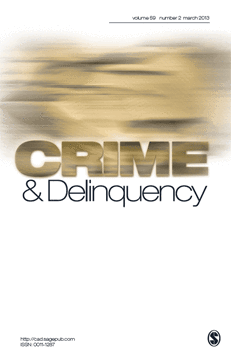
CRIME & DELINQUENCY
Connecting research with real-world implications.CRIME & DELINQUENCY, published by SAGE PUBLICATIONS INC, is a premier journal dedicated to advancing the study of criminology and criminal justice. With an esteemed ISSN of 0011-1287 and E-ISSN 1552-387X, this influential journal has been a vital resource since its inception in 1955, continuing to engage in rigorous research and discourse through to 2024. Recognized with a Q1 ranking in both Law and Pathology and Forensic Medicine, CRIME & DELINQUENCY boasts an impressive Scopus ranking, placing it in the top 8% of journals in Social Sciences - Law and the top 31% in Medicine - Pathology and Forensic Medicine. This journal serves as an essential forum for researchers, professionals, and students to explore pressing issues related to crime, delinquency, and their societal implications. Although not an open-access journal, it offers a valuable repository of insightful research and analysis that informs practices and policies within the field. To stay abreast of the latest findings and contribute to the ongoing discourse, CRIME & DELINQUENCY is a must-read for all committed to understanding and addressing criminal behavior in society.

CRIMINAL JUSTICE STUDIES
Advancing the discourse in criminal justice.CRIMINAL JUSTICE STUDIES, published by Routledge Journals, Taylor & Francis Ltd, is a leading journal in the field of criminal justice and law, boasting an impressive 2023 Q1 category ranking. With an ISSN of 1478-601X and an E-ISSN of 1478-6028, this journal serves as a pivotal platform for disseminating high-quality research that spans various dimensions of criminal justice, including policy, theory, and practice. Since its inception in 2007, CRIMINAL JUSTICE STUDIES has become a vital resource for scholars, practitioners, and students, addressing contemporary challenges and developments within the field. With a remarkable Scopus rank of #157 out of 1025 in Law, positioning it within the 84th percentile, this journal is dedicated to advancing knowledge and fostering critical discourse. Although it does not offer open access, the insights shared within its pages are invaluable to those seeking to deepen their understanding of criminal justice systems worldwide. Based in the United Kingdom and running through 2024, CRIMINAL JUSTICE STUDIES is essential for those engaged in research and practice, pushing the boundaries of knowledge and contributing to the evolution of criminal justice scholarship.

Journal of Criminal Psychology
Pioneering interdisciplinary research at the intersection of psychology and law.Journal of Criminal Psychology, an esteemed publication by EMERALD GROUP PUBLISHING LTD, serves as a pivotal resource in the interdisciplinary study of criminal behavior through the lenses of psychology and law. Since its inception in 2011, this journal has significantly contributed to the understanding of psychological principles as they apply to crime, law enforcement, and social justice, making it a vital source for both researchers and practitioners. With a commendable ranking of Q1 in Law and Q3 in Applied and Social Psychology for 2023, the journal guarantees high-quality research findings that can influence policy and practice across these domains. Although it does not offer open access, its rigorous peer-review process ensures that every published article adheres to the highest academic standards. The Journal of Criminal Psychology not only fosters academic discourse but also drives innovation in criminal justice practices, making it essential reading for anyone dedicated to the enhancement of ethical standards in legislation and law enforcement.
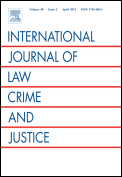
International Journal of Law Crime and Justice
Fostering Global Dialogue on Justice and Legal InnovationsThe International Journal of Law Crime and Justice, published by ELSEVIER SCI LTD, serves as a pivotal platform for the dissemination of cutting-edge research in the fields of law, crime, and justice. Established in 2008, the journal has established itself as a reputable source in its domain, holding a respectable Q2 ranking in Law, Political Science and International Relations, as well as Sociology and Political Science as of 2023. With an impact factor reflecting its influence, this journal ranks favorably within the top percentiles of Scopus in several social science categories, making it a critical resource for scholars and practitioners. The journal promotes open access, ensuring that vital research is accessible to a global audience. Scholars interested in the intricate intersection between legal studies, societal challenges, and crime will find the journal's objectives aligned with fostering knowledge and innovation in this dynamic field. Operating from its headquarters in London, England, the journal continues to invite substantial contributions that address contemporary issues and enhance our understanding of law and justice worldwide.
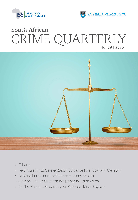
South African Crime Quarterly-SACQ
Championing research that informs and transforms justice systems.South African Crime Quarterly (SACQ) is an esteemed open-access journal dedicated to the comprehensive examination of crime and justice issues in South Africa. Published by the Institute for Security Studies, SACQ aims to provide a platform for researchers, practitioners, and policymakers to disseminate innovative research, case studies, and theoretical discussions that address the complexities of crime in the region. Since its transition to open access in 2015, the journal has fostered a wider dissemination of knowledge, promoting accessibility for students and professionals alike. With an ISSN of 1991-3877, SACQ stands out as an essential resource, driving informed dialogue and enhancing the understanding of security challenges in South Africa. The journal encourages submissions that contribute to evidence-based practices and policies, making it a vital tool for those committed to addressing crime and improving safety within communities.

Trends and Issues in Crime and Criminal Justice
Innovating solutions for a safer society.Trends and Issues in Crime and Criminal Justice is a leading journal in the field of criminology, published by the Australian Institute of Criminology. This esteemed journal, recognized with an H-index that reflects its influence and contribution to the social sciences, particularly law, spans from 2011 to 2024 and is ranked in the Q1 category within its discipline according to the 2023 data. With a Scopus ranking of #123 out of 1025 in the Social Sciences - Law category, placing it in the 88th percentile, it serves as a critical resource for researchers, practitioners, and students alike.
Focused on innovative research and emerging issues within crime and criminal justice, the journal seeks to foster scholarly collaboration and discourse, making it an essential hub for new ideas and evidence-based practices in the field. The journal’s commitment to advancing knowledge and influencing policy ensures that it remains an influential voice in criminological studies, aiming to address pressing issues facing societies globally.